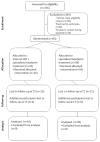Pilot Randomized Controlled Trial of Internet-Delivered Cognitive-Behavioral Treatment for Pediatric Headache
- PMID: 26316194
- PMCID: PMC4715642
- DOI: 10.1111/head.12635
Pilot Randomized Controlled Trial of Internet-Delivered Cognitive-Behavioral Treatment for Pediatric Headache
Abstract
Objective: To evaluate the feasibility and preliminary effectiveness of an Internet-delivered cognitive-behavioral therapy (CBT) intervention for adolescents with chronic headache.
Background: Headache is among the most common pain complaints of childhood. Cognitive-behavioral interventions are efficacious for improving pain among youth with headache. However, many youth do not receive psychological treatment for headache due to poor access, which has led to consideration of alternative delivery modalities such as the Internet.
Methods: We used a parallel arm randomized controlled trial design to evaluate the feasibility and preliminary effectiveness of an Internet-delivered family-based CBT intervention, Web-based management of adolescent pain. Adolescents were eligible for the trial if they were a new patient being evaluated in a specialized headache clinic, between 11 and 17 years of age, and had recurrent headache for 3 months or more as diagnosed by a pediatric neurologist. Eighty-three youths were enrolled in the trial. An online random number generator was used to randomly assign participants to receive Internet CBT adjunctive to specialized headache treatment (n = 44) or specialized headache treatment alone (n = 39). The primary treatment outcome was headache days.
Results: Youth and parents in the Internet CBT group demonstrated high levels of engagement with the web program and reported satisfaction with the intervention. Multilevel modelling (MLM) was used to conduct hypothesis testing for continuous outcomes. For our primary treatment outcome of headache days, adolescents reported a statistically significant reduction in headache days from baseline to post-treatment and baseline to 3-month follow-up in both treatment conditions (main effect for time F(2, 136) = 19.70, P < .001). However, there was no statistically significant difference between the Internet CBT group and the specialized headache treatment group at post-treatment or follow-up (group × time interaction F(2, 134) = 0.94, P = .395). For our secondary treatment outcomes, findings from MLM showed that adolescents in both groups demonstrated statistically significant improvement headache pain intensity, activity limitations, depressive symptoms, and parent protective behaviors from baseline to post-treatment and these gains were maintained at 3-month follow-up. Adolescent anxiety symptoms and sleep did not change during the study period for either group. There were no statistically significant group differences on any secondary outcomes at post-treatment or follow-up (P > .05 for all outcomes). No adverse events were reported.
Conclusion: Although adjunctive Internet CBT did not lead to additional benefit in this population, future research should evaluate whether it is an effective intervention for adolescents with headache who are unable to access specialized headache treatment.
Keywords: headache, children, adolescents, pediatric, cognitive-behavioral therapy, Internet intervention, randomized controlled trial.
© 2015 American Headache Society.
Conflict of interest statement
Conflict of Interest Statement: No conflict
References
-
- King S, Chambers CT, Huguet A, MacNevin RC, McGrath PJ, Parker L, MacDonald AJ. The epidemiology of chronic pain in children and adolescents revisited: A systematic review. Pain. 2011;152(12):2729–2738. doi:0.1016/j.pain.2011.07.016. - PubMed
Publication types
MeSH terms
Grants and funding
LinkOut - more resources
Full Text Sources
Other Literature Sources
Medical
Miscellaneous


